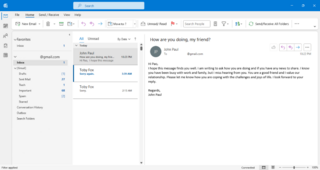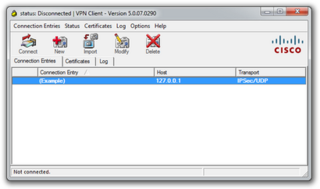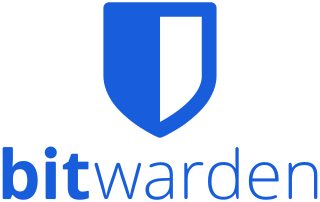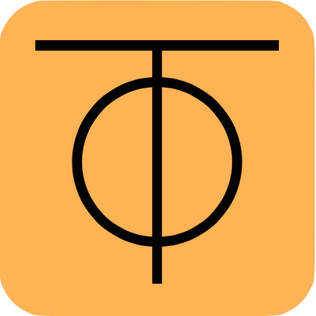
Mac OS X Server is a series of discontinued Unix-like server operating systems developed by Apple Inc. based on macOS. It provided server functionality and system administration tools, and tools to manage both macOS-based computers and iOS-based devices, network services such as a mail transfer agent, AFP and SMB servers, an LDAP server, and a domain name server, as well as server applications including a Web server, database, and calendar server.

Microsoft Outlook is a personal information manager software system from Microsoft, available as a part of the Microsoft 365 software suites. Though primarily being popular as an email client for businesses, Outlook also includes functions such as calendaring, task managing, contact managing, note-taking, journal logging, web browsing, and RSS news aggregation.
OpenVPN is a virtual private network (VPN) system that implements techniques to create secure point-to-point or site-to-site connections in routed or bridged configurations and remote access facilities. It implements both client and server applications.
Datagram Transport Layer Security (DTLS) is a communications protocol providing security to datagram-based applications by allowing them to communicate in a way designed to prevent eavesdropping, tampering, or message forgery. The DTLS protocol is based on the stream-oriented Transport Layer Security (TLS) protocol and is intended to provide similar security guarantees. The DTLS protocol datagram preserves the semantics of the underlying transport—the application does not suffer from the delays associated with stream protocols, but because it uses UDP or SCTP, the application has to deal with packet reordering, loss of datagram and data larger than the size of a datagram network packet. Because DTLS uses UDP or SCTP rather than TCP, it avoids the "TCP meltdown problem", when being used to create a VPN tunnel.
strongSwan is a multiplatform IPsec implementation. The focus of the project is on authentication mechanisms using X.509 public key certificates and optional storage of private keys and certificates on smartcards through a PKCS#11 interface and on TPM 2.0.
This is a comparison of notable free and open-source configuration management software, suitable for tasks like server configuration, orchestration and infrastructure as code typically performed by a system administrator.

Cisco Systems VPN Client is a software application for connecting to virtual private networks based on Internet Key Exchange version 1.
This is a list of file synchronization software for which there are Wikipedia articles.
Plastic SCM is a cross-platform commercial distributed version control tool developed by Códice Software for Microsoft Windows, Mac OS X, Linux, and other operating systems. It includes a command-line tool, native GUIs, diff and merge tool and integration with a number of IDEs. It is a full version control stack not based on Git.

iCloud is a cloud service developed by Apple Inc. Launched on October 12, 2011, iCloud enables users to store and sync data across devices, including Apple Mail, Apple Calendar, Apple Photos, Apple Notes, contacts, settings, backups, and files, to collaborate with other users, and track assets through Find My. It is built into iOS, iPadOS, watchOS, tvOS, macOS, and visionOS. iCloud may additionally be accessed through a limited web interface and Windows application.

ownCloud is a free and open-source software project for content collaboration and sharing and syncing of files in distributed and federated enterprise scenarios. It allows companies and remote end-users to organize their documents on servers, computers, and mobile devices and work with them collaboratively while keeping a centrally organized and synchronized state.
OpenConnect is a free and open-source cross-platform multi-protocol virtual private network (VPN) client software which implement secure point-to-point connections.

SoftEther VPN is free open-source, cross-platform, multi-protocol VPN client and VPN server software, developed as part of Daiyuu Nobori's master's thesis research at the University of Tsukuba. VPN protocols such as SSL VPN, L2TP/IPsec, OpenVPN, and Microsoft Secure Socket Tunneling Protocol are provided in a single VPN server. It was released using the GPLv2 license on January 4, 2014. The license was switched to Apache License 2.0 on January 21, 2019.

Syncthing is a free and open source peer-to-peer file synchronization application available for Windows, macOS, Linux, Android, Solaris, Darwin, and BSD. It can sync files between devices on a local network, or between remote devices over the Internet. Data security and data safety are built into its design. Version 1.0 was released in January 2019 after five years in beta.

Shadowsocks is a free and open-source encryption protocol project, widely used in China to circumvent Internet censorship. It was created in 2012 by a Chinese programmer named "clowwindy", and multiple implementations of the protocol have been made available since. Shadowsocks is not a proxy on its own, but (typically) is the client software to help connect to a third-party SOCKS5 proxy, which is similar to a Secure Shell (SSH) tunnel. Once connected, internet traffic can then be directed through the proxy. Unlike an SSH tunnel, shadowsocks can also proxy User Datagram Protocol (UDP) traffic.

Pydio Cells, previously known as just Pydio and formerly known as AjaXplorer, is an open-source file-sharing and synchronisation software that runs on the user's own server or in the cloud.
Wire is an encrypted communication and collaboration app created by Wire Swiss. It is available for iOS, Android, Windows, macOS, Linux, and web browsers such as Firefox. Wire offers a collaboration suite featuring messenger, voice calls, video calls, conference calls, file-sharing, and external collaboration – all protected by a secure end-to-end-encryption. Wire offers three solutions built on its security technology: Wire Pro – which offers Wire's collaboration feature for businesses, Wire Enterprise – includes Wire Pro capabilities with added features for large-scale or regulated organizations, and Wire Red – the on-demand crisis collaboration suite. They also offer Wire Personal, which is a secure messaging app for personal use.
Outline VPN is a free and open-source tool that deploys Shadowsocks servers on multiple cloud service providers. The software suite also includes client software for multiple platforms. Outline was developed by Jigsaw, a technology incubator created by Google.[3]

Bitwarden is a freemium open-source password management service that stores sensitive information, such as website credentials, in an encrypted vault. The platform offers a variety of client applications, including a web interface, desktop applications, browser extensions, mobile apps, and a command-line interface. Bitwarden offers a free US or European cloud-hosted service as well as the ability to self-host.

ZeroTier, Inc. is a software company with a freemium business model based in Irvine, California. ZeroTier provides proprietary software, SDKs and commercial products and services to create and manage virtual software-defined networks. The company's flagship end-user product ZeroTier One is a client application that enables devices such as PCs, phones, servers and embedded devices to securely connect to peer-to-peer virtual networks.










